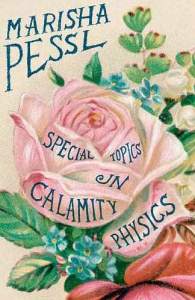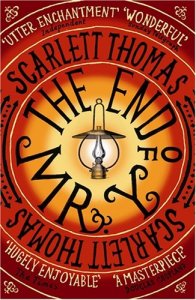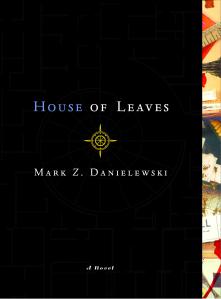Margot McGovern reflects on reading Marisha Pessl‘s eerie Gothic thriller, Night Film (2013).
This is actually a sneaky repost of a review from my personal blog, margotmcgovern.com. I read Night Film yonkers ago when it first came out, and it’s haunted me ever since. It’s one of those rare novels that’s genuinely terrifying, and for me it’s a near-perfect literary thriller. it’s still one of the top books I recommend to friends—I’m not sure I remember who currently has my copy—so I thought I’d give it a shout out to the lovely readers here too.
Here’s my original review:
 When I saw this on the new releases wall at my local bookshop I very literally squealed with excitement. It was highly undignified, but I didn’t care. After a seven-year silence, Marisha Pessl was BACK.
When I saw this on the new releases wall at my local bookshop I very literally squealed with excitement. It was highly undignified, but I didn’t care. After a seven-year silence, Marisha Pessl was BACK.
Her first novel, Special Topics in Calamity Physics (2006) is a highly impressive, if ambitious, debut: the story of a precocious seventeen-year-old girl who falls under the enchantment of an unusually intimate clique of students with almost cultish devotion to their film studies teacher—who we know from the Prologue dies under mysterious circumstances. It reads like the love child of Donna Tartt’s The Secret History (1992) and Vladimir Nabokov’s Lolita (1955). But like The Secret History, it’s almost too clever for it’s own good, making reference to more books and films than many would read or see in a lifetime. That said, it’s a brilliant read and I couldn’t wait to see how Pessl’s writing had matured.
As in Special Topics in Calamity Physics, Pessl’s second novel, Night Film, concerns a mysterious death. Ashley Cordova, the twenty-four-year-old daughter of reclusive film maker, Stanislas Cordova, is found dead at the bottom of an elevator shaft in an abandoned building in New York City. The police call it a suicide, but disgraced investigative journalist, Scott McGrath, thinks the truth is far more sinister. Joined by Hopper (a small-time drug dealer and childhood friend of Ashley’s) and Nora (a wannabe actress and one of the last people to speak with Ashley), McGrath decides to investigate. However, nothing could prepare him (or the reader) for just how deep this particular rabbit hole goes. What follows is an unnerving descent into a Gothic underworld presided over by the monstrous Other, the unseen puppet master: Cordova.
Cordova is the twenty-first century’s answer to the vampire—more myth than man—figuratively feeding off his actors, plumbing the hidden depths of their experience and draining them of their most vivid emotions and memories to make films that are polarising—exercises in extreme beauty and terror that shock the viewer into a heightened state of being. in Cordova’s own words they are: ‘sovereign, deadly, perfect’. No one who comes in contact with Cordova can resist him, and everyone who meets him walks away irrevocably altered. But no one has seen Cordova in years. He gave his last interview to Rolling Stone in 1977 and is now believed to reside at The Peak—a vast rural estate, complete with sound stages, that he supposedly never leaves. Most of his actors won’t speak about working with him, and those that do soon disappear. His most loyal and obsessive fans, the Cordovites, meet on the Blackboards—a protected forum on a hidden internet—to dissect his films and post evidence of possible sightings of the director and his family.
Needless to say, the space around Cordova is filled with rumours: that he’s dead; that he never existed and the genius behind his films is his long-time assistant; that he’s an occultist; a sex fiend; that he loved Ashley; that they were estranged; that he is quietly manipulating McGrath’s investigation, drawing him away from his loved ones, isolating him; that he is entirely ignorant of the case mounting against him; and that ‘there is something he does to the children’. He is our greatest fear—the unknowable answer to the question most are too afraid to ask.
That’s not just me being pretentious. The ‘overwhelming question’ of Night Film is taken from T. S. Eliot’s poem, ‘The Love Song of J. Alfred Prufrock’: ‘Do I dare disturb the universe?’ For those who haven’t yet had the haunting experience of reading ‘Prufrock’, a) you really must, and b) on a basic level, it’s about a man who grows old trying to work up the courage to tell the woman he loves how he feels about her. He admits, ‘I have measured out my life with coffee spoons,’ wondering, ‘Would it have been worthwhile, to have bitten off the matter with a smile, / to have squeezed the universe into a ball / to roll it toward some overwhelming question’? At the end of the poem, having failed to voice his secret love, he laments: ‘I have heard the mermaids singing, each to each. I do not think that they will sing to me.’ While ostensibly a love poem, it’s about the pursuit of desire and ponders the great risks of a life less ordinary. The Cordovas are particularly taken with this poem, they determine to ‘disturb the universe,’ break from the routine of ‘tea and cakes and ices’ and inhabit the place where the mermaids sing, ‘with the colours turned way up’.
Throughout the narrative the question is raised again and again, ‘Do I dare?’ Do we accept the logical explanation for Ashley’s suicide, or do we leave caution and indecision behind and step into the darkness, even if it means realising our greatest fear? Do we pull back the curtain and hunt for that which feeds Cordova’s genius knowing it is either the most beautiful or most terrible thing imaginable? Would the nightmare be worth it, after all?
It’s really a question we answer, however passively, every time we enter a Gothic narrative, or any narrative that draws us into a heightened emotional state, but Pessl forces the reader to make a conscious choice. Not only does she present evidence for rational and irrational, banal and terrifying explanations for Ashley’s death, she asks the reader to play detective. Interwoven with McGrath’s narrative are his source materials: the police file, blog posts about the family, recorded telephone conversations, photographs, fans’ accounts of chance meetings with those close to Cordova. For keen readers, there’s also a downloadable app for your phone, so that when you hold it over the Cordovites’ symbol that appears on seemingly random pages, you can access hidden ‘easter eggs’ with extra clues—music, interviews, lecture notes.
Gothic narratives are often fragmented—accounts delivered through secondary and tertiary sources, newspaper clippings, letters, diary entries—with the intention of obscuring and distorting the object of fear (and by doing so feeding its power in our imagination), as well as calling into question its very existence. Pessl takes this idea to a higher level so that we find ourselves—ear pressed to our iPhones—listening to Ashley, a musical prodigy, play the piano, or an interview with a serial killer who uses Cordova’s films for inspiration. This is one book you do not want to be reading after lights out.
So essentially, Night Film is ‘The Love Song of J. Alfred Prufrock’ revisited through a multi-media Gothic narrative about a reclusive filmmaker whose films make David Lynch’s work look like Disney. And did I mention that many of the clues to finding the truth about Ashley’s death lie in picking up on key details and symbols in Cordova’s films? Pretentious much? That would be a resounding YES. But does it work? For me, also yes. But I love ‘Prufrock’ and scary films and the Gothic and books that serve as ‘a [grandiose] summons to break out of your locked room, real or imagined’.
But Night Film is not for everybody. Pessl’s writing style is highly self-conscious. Not only does she take every opportunity to slip in references to other books, poems films and literary figures, she occasionally compromises character for a fancy turn of phrase. McGrath finds himself in some pretty extreme situations, and yet still manages to construct elaborate metaphors and images to describe his predicaments, which makes it hard to get a sense of who he is, or rather it reads as though Pessl rather than McGrath is speaking to us. That said, the story moves quickly and it’s very easy to get swept up in.
Like Special Topics in Calamity Physics, Night Film is impressive for the complexity and detail of its twisting narrative and I suspect if I were to read it again, I would find new levels to explore. However, part of the appeal of a book like this is that it can be enjoyed as a simple thriller or as something deeper, depending on how much the reader chooses to invest. If you are looking for something different, and aren’t afraid of the dark, Night Film should be top of your ‘to read’ list.
Night Film is available through Amazon (Kindle), Book Depository and Kobo.
If you enjoyed Night Film, these title might also tickle your fancy:
Like what you see? Keep in touch:
 |
 |
 |
 |
And get the latest from Lectito delivered to your inbox.









